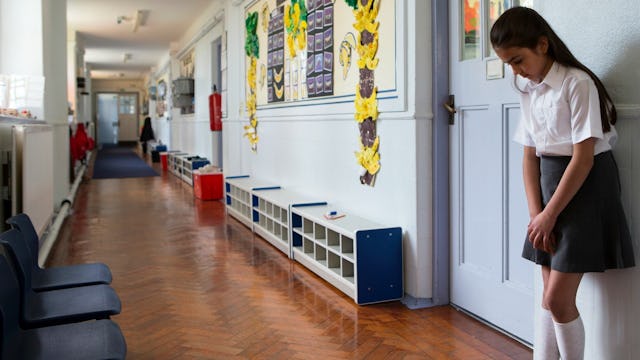Some Schools Are Still Paddling Kids, And That Needs To Stop ASAP

Earlier this month, NPR ran a segment titled “Where Corporal Punishment Is Still Used In Schools, Its Roots Run Deep,” where it presented a staggering statistic. NPR says, “A recent investigation by Education Week shows that in the 2013–2014 school year, about 110,000 students were physically punished nationwide. That’s in part because in some states, including Mississippi, Alabama, Arkansas and Texas, tens of thousands of students are paddled every year.”
What the hell?
I’m 34, and back in the ’80s when I was growing up in Utah, a predominately conservative state, my understanding was that paddling as a form of school punishment was a thing of the past. I will be the first to admit that I held this assumption until now, at this point, when I heard this story on my commute to work. I assume that’s why I listened to it with my mouth agape in total shock that paddling in school was actually still a thing, still legal.
It got even more complicated when I learned it happened not only in elementary schools, but also high schools.
As a father of three, I have to assume that there were other parents who still held this assumption. To put this into perspective for anyone not living in the South, I can recall reading a story in elementary school where a child was paddled. It was probably something by Mark Twain. It ended with us having a classroom discussion about how paddling was something teachers used to do, but don’t practice now.
To further complicate things, according to NPR, most corporal punishment happens with parental permission. The main subject of the story is Robbinsville High School in North Carolina, where David Matheson is the principal. He’s the only high school principal in the state who still performs corporal punishment. And he only does it with parental permission, which he almost always gets.
So let’s think about this: We are talking children between the ages of 15 to 18 being brought to the principal’s office for some offense — the example used by NPR was a sophomore whose phone went off in class, and she was given the choice between being paddled for the infraction or attending in-school suspension.
I’d like to step aside here and point out that being paddled for having a cell phone going off in class sounds like a huge anachronism, like someone in 2017 getting pulled over for driving a horse and buggy on the freeway. But it happened, and this girl in her early teens chose paddling. Her father was called and responded with, “Just paddle her because down here in the mountains, we do it the old-school way.” His words.
Listen, I don’t want to try to make some broad stroke accusation that this man is a bad father, or that what’s going on in this North Carolina high school is right out of the 1800s, so I’ll let you make your own assessment here. What I will say is that the majority of American schools have moved past this practice, and despite what you might hear on Fox News, our country hasn’t fallen into an anarchist state where America’s youth are running around feral and putting pig heads on sticks like in Lord of the Flies.
Now, keep in mind that my statement above is in direct contradiction to Principal Matheson’s position: “I think if more schools did it, we’d have a whole lot better society. I do, I believe that.”
This was his argument against the scientific body of research showing that corporal punishment results in higher dropout rates, increased incidences of depression and substance abuse, and increased violent episodes down the road.
On the positive side, if there is a positive side, we have to opt into letting a school administrator hit our kids. Truthfully, if a school principal called me and asked if he could paddle one of my children, I’d say, “Hell no.” I’d briefly consider kicking his ass, but decide the mature thing to do would be to immediately file a complaint, or move to another school district.
However, that might not be an option for some parents, particularly those in the rural South where it sounds like much of this is going on. If you are in that situation, I don’t envy you. Just make it incredibly clear that nobody has permission to lay a hand on your kid(s).
In December, dozens of groups, including the National PTA, Children’s Defense Fund, and American Academy of Pediatrics signed a letter supporting an end to corporal punishment. The overall goal is stated in the letter: “By eliminating the harmful practice of corporal punishment and implementing positive, evidence-based policies, local and state leaders can help students achieve access to a safe and high-quality education.” Like those who signed this letter, I don’t believe corporal punishment has a place in education. It’s something that needs to truly be ancient history.